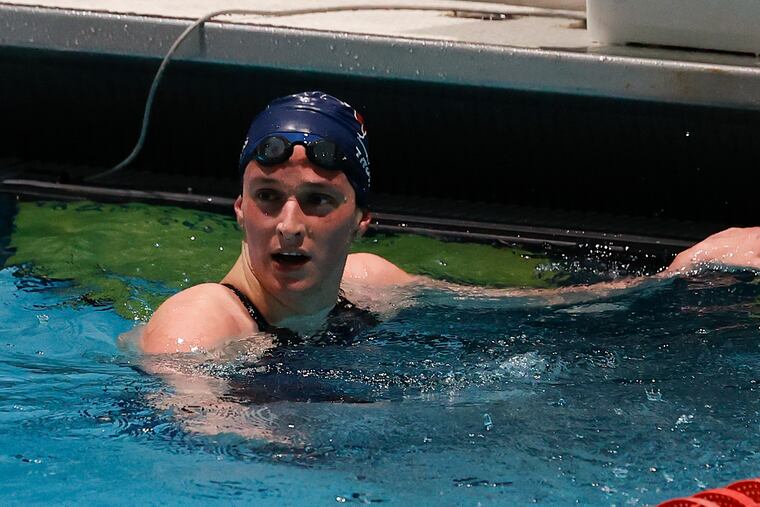Penn’s Lia Thomas will swim in three National Championship events. Two teammates also qualify.
At the March 16 to 19 national championship, all eyes will be on Thomas, a 22-year-old transgender woman at the center of a heated national debate on trans athletes' rights to play sports.

Three University of Pennsylvania women’s swimmers will travel to Atlanta later this month to compete in the NCAA championships, including star Lia Thomas, who enters the meet as the top-ranked athlete in two events.
Thomas, a transgender woman, will compete in the 100-, 200-, and 500-yard freestyle events, according to the pre-selection time sheets. She holds the nation’s best times in the 200- and 500-yard freestyle, giving her the top seed in those events. She is seeded 10th in the 100 free.
» READ MORE: Penn swimmer Lia Thomas’ success has prompted national debate about trans athletes. Here’s what to know.
Thomas’ teammates Catherine Buroker — who twice became an Ivy League champion last month — and Anna Kalandadze both qualified for the 500-yard freestyle and 1,650-yard freestyle events.
Buroker, a junior, enters the 500 free seeded 28th, and Kalandadze 55th. In the 1,650-free, Kalandadze, junior, is seeded 18th, and Buroker 53rd.
At the national championship, which runs March 16 to 19 at Georgia Tech’s McAuley Aquatic Center, all eyes will be on Thomas, a 22-year-old senior who has been at the center of a heated national debate on trans athletes’ — especially trans women’s — rights to play sports.
Thomas swam on the men’s team for three years before beginning her medical transition in May 2019. This is her first season on the women’s team.
Thomas’ detractors say that her male-at-birth assignment gives her an unfair biological advantage — like longer arms, endurance abilities, and strength — while supporters say that because Thomas has followed all eligibility protocols, including being on hormone therapy for about 34 months, she has a right to compete.
Her success led the NCAA and national swimming governing board to change their eligibility policies for trans athletes. Her ability to compete in Atlanta was questioned after USA Swimming updated its eligibility standards for trans women, which would have disqualified Thomas.
The NCAA ultimately opted not to immediately adopt those standards, clearing the way for Thomas to swim.
Thomas was not listed to compete in the 1,650 free, a surprise to some given she excelled in distance swimming earlier in her career. As a sophomore member of the men’s team in 2019, Thomas was ranked 34th nationally in that race, barely missing an invitation to the NCAA championship.
It was also the 1,650-yard free that partially thrust Thomas into the national spotlight, when, at a December meet in Ohio, she won the mile race by nearly 38 seconds. A video of her finish went viral, with critics using it as “evidence” that she held a physical advantage.
Her best time in that race, though, only ranked her 11th in the NCAA, about 17 seconds behind the nation’s best miler from the University of Tennessee. And because short- and long-distance swimming require different training regimens, it’s not unusual that she opted for her stronger, shorter distance events.
The Quakers’ Buroker and Kalandadze competed again last weekend in a last-ditch effort to qualify for the championship — and it worked. Buroker crushed her personal-best time in the 500 free, and Kalandadze shaved 21 seconds off her season-best time, and 5 seconds off her lifetime best.
Yale’s Iszac Henig, who was also top contender at the Ivy League championship, qualified for three events in Atlanta, and will compete against Thomas in two.
Henig — a trans man who remains eligible to compete on the women’s team because he has not yet begun hormone therapy — enters the 50-yard freestyle seeded 19th; the 100-yard freestyle seeded 18th; and the 100-yard butterfly seeded 60th.
At the Ivy League championship, Henig and Thomas faced off in the 100 free, with Thomas winning by just two-tenths of a second.
Both trans athletes emerged from the meet with multiple titles and newly established records.
Thomas won three championships — the 200-, 500-, and 100-yard freestyles — and broke Harvard University Blodgett Pool records in all three and Ivy League meet records in two. She also won a title with her teammates in the 400-yard freestyle relay.